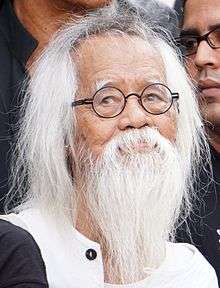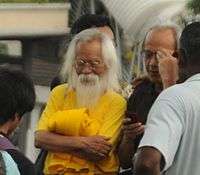A. Samad Said
| Datuk A. Samad Said Malaysian National Laureate | |
|---|---|
 A. Samad Said in 2015 | |
| Born |
9 April 1935 Durian Tunggal, Malacca, Straits Settlement |
| Occupation | Novelist, poet |
| Language | Malay, English |
| Nationality | Malaysian |
| Alma mater | Victoria School, Singapore |
| Notable works | Salina (novel) |
| Notable awards |
|
Datuk Abdul Samad bin Mohamed Said, pen name A. Samad Said (born 9 April 1935)[1] is a Malaysian poet and novelist who, in May 1976, was named by Malay literature communities and many of the country's linguists as the Pejuang Sastera [Literary Exponent] receiving, within the following decade, the 1979 Southeast Asia Write Award and, in 1986, in appreciation of his continuous writings and contributions to the nation's literary heritage, or Kesusasteraan Melayu, the title Sasterawan Negara. In 2015, he joined the Democratic Action Party.[2]
Education
A native of the Malaccan Kampung village of Belimbing Dalam, near the town of Durian Tunggal, young Abdul Samad completed his primary education during the World War II years of 1940–46 at Singapore's Sekolah Melayu Kota Raja (Kota Raja Malay School). During the wartime occupation of Malaya and Singapore by the Japanese Empire, he attended the occupying authorities' Sekolah Jepun school for a brief three-month period. Upon the war's conclusion, he furthered his studies at Singapore's Victoria School, graduating in 1956 with Senior Cambridge Certificate.[3] Although starting as a clerk in a hospital, he was soon able to achieve his ambition of becoming a full-time writer in Utusan Melayu, Warta Tebrau and Berita Harian, authoring numerous poems and short stories in the years to come.
Achievements
- Pejuang Sastera (1976)
- SEA Write Award (1979)
- Sasterawan Negara (1985)
- Sasterawan Nusantara (1999)
His poem, "The Dead Crow" was translated into English language and was included in the Malaysian lower secondary school English literature curriculum from 2000 to 2009.[4] A survey was done among 360 students and it was found that 10 (2.8%) of the students described the poem as "hardest to understand" of all the poems taught in secondary school.[5]
Works
Among his anthologies are Suara Dari Dinding Dewan (2003) and Dirgahayu Dr. Mahathir & Rindu Ibu (2004). His most recent anthology of essays is Ilham Di Tepi Tasik (2006). A. Samad Said is also known as Hilmy, Isa Dahmuri, Jamil Kelana, Manja, Mesra and Shamsir.
|
|
Activism and political views

In 2009, A. Samad Said together with four other literary scholars, campaigned to abolish PPSMI (Teaching of Mathematics and Science in English) in Malaysian secondary schools.[6][7] He believed that such opposition is needed to prevent the degradation of Malay language usage in Malaysia.[8] He also participated in an anti-PPSMI rally near the Malaysia Royal Palace in order to hand over a memorandum to the palace.[9]
He became the co-chairperson for Bersih 2.0 rally together with Ambiga Sreenevasan in 2011 in order to support a free and fair elections in Malaysia.[10] He also composed a poem named "Unggun Bersih" (Cleansing fire) where the poem became a subject of police investigation for sedition.[11][12] Disappointed with the lack of electoral reform, he openly supported for Bersih 3.0 rally in the following year.[13] During this rally, he composed another two poems which expressed his disappointment when he was not allowed to go to National Mosque of Malaysia to conduct his prayers and describing a clash between the Bersih 3.0 supporters and authorities guarding the Merdeka Square, Kuala Lumpur.[14] During the 2013 Malaysian general elections, he openly supported Pakatan Rakyat (PR) coalition in order to end the Barisan Nasional (BN) rule in Malaysia, believing that PR can deliver on fixing the problems in Malaysian healthcare, education, and democracy systems. He also criticised BN for using racist, vote-buying, and scare-tactics during the election.[15] In Samad Said's opinion, Chin Peng was not a communist terrorist as depicted by Malaysian government but should be regarded as a freedom fighter and be allowed back to Malaysia from exile in Thailand. This is because Chin Peng had fought against the Japanese and British colonial masters before the independence of Malaya.[16] On 13 June 2015, Samad Said joined Democratic Action Party (DAP). He described the party as a "truly Malaysian party, which is clean, focused, with a genuine Malaysian dream".[17]
References
- ↑ Datuk Abdul Samad Muhammad Said (A. Samad Said). arkib.gov.my
- ↑ Radzi Razak (13 June 2015). "'Pak Samad can counter DAP's chauvinist label'". Malaysiakini.
- ↑ Biografi A. Samad Said: memberi hati nurani [Biography A. Samad Said : give conscience] (in Malay). ITBM. 2012. ISBN 9789830688749.
- ↑ Gilbert, Perrieire; Jana, Maya; Renee, Allen; Wong, Chee Fui; Wong, Ming Yook (2007). PMR English - Complete Text and Guide - Integrated Curriculum for secondary schools. Shah Alam, Malaysia: Arah Pendidikan Sdn Bhd. p. 251. ISBN 9789833717088. Retrieved 30 August 2015.
- ↑ Chew, Fong Peng; Tan, Li Chin (30 June 2011). "International Conference - International Education:Focus on the Learner - Malaysia Ministry of Education's Selection of Poems for the Form Four and Form Five New Literature Component" (PDF): 3, 10. Archived from the original (PDF) on 30 August 2015. Retrieved 30 August 2015.
- ↑ Jason, Lai; Lai, Pik Yien. "Revealing the reality of PPSMI". Scientific Malaysian Magazine. Archived from the original on 14 June 2014. Retrieved 30 August 2015.
- ↑ Jimadie, Shah Othman (5 May 2009). "Lima sasterawan negara tolak PPSMI (Five national laurates reject PPSMI)" (in Malay). Malaysiakini. Archived from the original on 19 August 2015. Retrieved 30 August 2015.
- ↑ "PPSMI: Samad Said nafi diperalat pembangkang (PPSMI:Samad Said denies being used by the opposition parties)" (in Malay). Malaysiakini. 25 February 2009. Archived from the original on 15 March 2009. Retrieved 30 August 2015.
- ↑ "PPSMI: Hadi, Samad Said disiasat polis (PPSMI: Hadi, Samad Said are being investigated by the police)" (in Malay). Malaysiakini. 13 March 2009. Archived from the original on 15 March 2009. Retrieved 30 August 2015.
- ↑ "Pak Samad: Why are they not targeting me?". Free Malaysia Today. 18 May 2012. Archived from the original on 24 July 2012. Retrieved 30 August 2015.
- ↑ "Unggun-Bersih (Cleansing fire)" (in Malay). Malaysiakini. 28 June 2011. Archived from the original on 28 June 2011. Retrieved 30 August 2015.
- ↑ "National laureate probed over 'seditious poem'". Malaysiakini. 27 June 2011. Archived from the original on 22 May 2015. Retrieved 30 August 2015.
- ↑ Clara, Chooi (5 April 2012). "Pak Samad ready for Bersih 3.0, 'disturbed' by lagging reforms". The Malaysian Insider. Archived from the original on 20 June 2012. Retrieved 30 August 2015.
- ↑ "Pak Samad rakam kehampaan dalam puisi (Pak Samad recorded his frustration in poems)" (in Malay). Malaysiakini. 1 May 2012. Archived from the original on 23 June 2012. Retrieved 30 August 2015.
- ↑ Syed Jaymal, Zahid (6 April 2013). "Openly campaigning for Pakatan, Pak Samad tells voters to oust BN". The Malaysian Insider. Archived from the original on 30 August 2015. Retrieved 30 August 2015.
- ↑ Rashvinjeet, S. Bedi; Dina, Murad (17 September 2013). "Samad Said's secret". The Star (Malaysia). Retrieved 30 August 2015.
“If you’re a communist, you’re bad. That’s not always the case because Chin Peng was a hero for fighting the Japanese during the emergency. The British gave him a big medal. Later he fought the British because they are colonists. You can’t say he’s a terrorist. He’s a freedom fighter and should be allowed home,” said Samad interestingly just a few days before Chin Peng passed away.
- ↑ Boo, Su-Lyn (13 June 2015). "DAP 'truly Malaysian' party, says newest member Pak Samad". The Malaysian Insider. Archived from the original on 30 August 2015. Retrieved 30 August 2015.